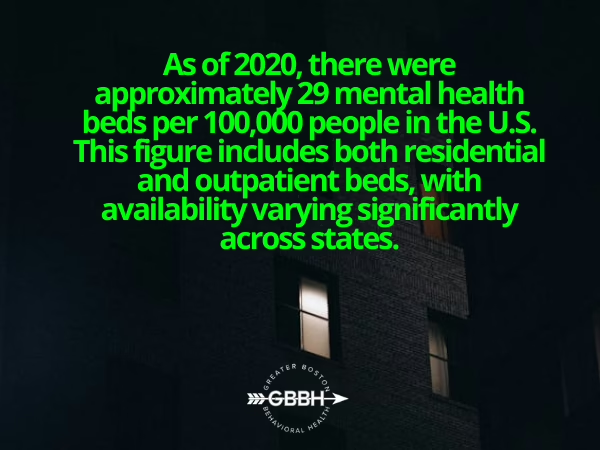When facing significant mental health challenges, trauma, or co-occurring disorders, it can be difficult to determine what level of care is needed. Residential treatment programs offer a structured, supportive environment designed to provide 24/7 medical and therapeutic care, helping individuals achieve lasting recovery. But is residential treatment the right choice for you or a loved one?
At Greater Boston Behavioral Health, we provide comprehensive residential mental health treatment programs tailored to meet each individual’s unique needs. This guide will explore the benefits of residential treatment, who it’s best suited for, and what to expect from a residential program to help you make an informed decision.
What is Residential Treatment?
Residential treatment is an immersive, live-in mental health care program where individuals receive round-the-clock medical supervision, therapy, and holistic support in a structured setting. Unlike outpatient treatment, which allows individuals to continue living at home while attending therapy, residential programs remove external stressors, providing an uninterrupted healing environment.
At Greater Boston Behavioral Health, our Residential Treatment Program in Boston integrates:
- 24/7 psychiatric and medical support for crisis intervention and stabilization.
- Individual and group therapy sessions tailored to each person’s condition.
- Evidence-based therapies such as CBT Therapy, DBT Therapy, and trauma therapy.
- Medication management and holistic wellness approaches to enhance overall mental health.
- Structured routines and skill-building exercises to promote long-term stability.
For individuals struggling with severe mental health conditions, trauma, or co-occurring substance use disorders, residential care can provide the necessary foundation for lasting recovery.
Who Can Benefit from Residential Treatment?
1. Individuals with Severe Mental Health Disorders
Some mental health conditions require intensive, supervised care to ensure stability, safety, and progress. Residential treatment is often the best option for individuals experiencing:
- Major depressive disorder with suicidal ideation or self-harming behaviors.
- Generalized anxiety disorder or panic disorder that severely impacts daily life.
- Bipolar disorder with extreme mood swings and impulsivity.
- Schizophrenia or psychotic disorders requiring intensive medication management and therapy.
- Post-traumatic stress disorder (PTSD) with debilitating flashbacks or emotional dysregulation.
For these individuals, a structured and supportive residential program can help manage symptoms and develop effective coping strategies.
2. Individuals Who Have Not Found Success with Outpatient Treatment
If previous outpatient therapy, medication, or counseling has not provided the desired relief, residential treatment may be necessary for a more immersive and intensive approach.
Signs that outpatient care is not enough:
- Continued difficulty functioning at work, school, or in relationships.
- Persistent mood instability, depression, or anxiety despite therapy.
- Increased self-destructive behaviors or self-isolation.
- Multiple relapses in substance use or mental health decline.
Residential treatment removes daily stressors, allowing individuals to focus entirely on healing and developing long-term coping skills.
3. Individuals Who Need a Safe and Supportive Environment
Some individuals struggling with mental health conditions, trauma, or addiction come from unstable home environments where recovery is challenging. If daily life stressors, toxic relationships, or triggers make it difficult to heal, residential treatment offers a structured and safe alternative.
Residential care provides:
- A stress-free environment away from negative influences.
- Healthy peer connections and community support.
- Accountability and encouragement to stay on track with recovery goals.
At Greater Boston Behavioral Health, we create a safe, judgment-free space where individuals can focus on healing without external pressures.
4. Individuals with Trauma and Emotional Dysregulation
Trauma survivors often struggle with emotional dysregulation, avoidance behaviors, and self-destructive coping mechanisms. An inpatient setting allows them to:
- Process past trauma in a structured environment.
- Develop healthy coping skills through DBT Therapy and trauma-informed care.
- Build emotional resilience to prevent future distress.
For individuals with PTSD, childhood trauma, or complex grief, residential treatment provides the necessary therapeutic intensity for healing.
5. Individuals with Co-Occurring Substance Use Disorders
Mental health and substance use disorders often occur together. For individuals struggling with both, residential treatment is highly recommended to ensure a comprehensive, dual-diagnosis approach.
Benefits of Residential Dual Diagnosis Treatment:
- Medical detoxification and substance withdrawal support.
- Therapeutic interventions for both addiction and mental health symptoms.
- Relapse prevention planning and coping skill development.
At Greater Boston Behavioral Health, we specialize in dual-diagnosis treatment, ensuring both conditions are treated simultaneously for long-term recovery success.
Key Benefits of Residential Treatment
1. 24/7 Professional Support
Mental health recovery is a process that requires constant care, monitoring, and intervention. Residential treatment ensures that individuals have immediate access to therapists, medical staff, and crisis intervention specialists whenever needed.
2. Intensive Therapy and Personalized Treatment Plans
At Greater Boston Behavioral Health, each resident receives a customized treatment plan incorporating:
- CBT Therapy to change negative thought patterns.
- DBT Therapy for emotional regulation and distress tolerance.
- Trauma Therapy Programs for those healing from past experiences.
- Medication management for individuals needing psychiatric stabilization.
3. Structured Environment for Stability
Many individuals with mental health disorders struggle with daily routines and structure. Residential treatment provides:
- A predictable schedule that reduces stress and anxiety.
- Therapeutic activities, workshops, and life skills training.
- Consistent monitoring and guidance to encourage progress.
4. Peer Support and Community Connection
Isolation often worsens mental health symptoms. Residential treatment helps individuals build support networks, peer relationships, and accountability partners through:
- Group therapy sessions.
- Shared experiences and mutual encouragement.
- Community-building activities.
5. Holistic Approach to Healing
Many Mental Health Treatment Programs incorporate alternative wellness therapies to promote overall well-being:
- Mindfulness and meditation techniques.
- Art and music therapy.
- Exercise and nutritional counseling.
These holistic methods help individuals develop a balanced, healthy lifestyle.
6. Smooth Transition to Aftercare and Long-Term Recovery
At Greater Boston Behavioral Health, our residential treatment program ensures a strong aftercare plan so individuals can continue healing after they leave.
Step-down levels of care include:
- Partial Hospitalization Programs (PHP) for structured day treatment.
- Intensive Outpatient Programs (IOP) for flexible yet consistent therapy.
- Ongoing outpatient counseling and support groups.
Our goal is to prepare individuals for a successful transition back into daily life while maintaining long-term mental wellness.
Take the Next Step Toward Healing with Greater Boston Behavioral Health
If you or a loved one is struggling with mental health challenges, trauma, or addiction, residential treatment could be the key to a healthier future.
Why Choose Greater Boston Behavioral Health?
- Expert clinical team specializing in CBT, DBT, and trauma recovery.
- Comprehensive residential care with personalized treatment plans.
- Strong aftercare planning to ensure long-term success.
Call Greater Boston Behavioral Health at (888)278-0716 to learn more about our Residential Treatment Programs and Mental Health Therapy Services in Boston. Your path to healing starts today—let us help you reclaim your life.
FAQ About Is Residential Treatment Right for You
What is residential treatment for mental health?
Residential treatment is a live-in mental health care program that provides 24/7 support, therapy, and medical supervision for individuals struggling with severe mental health conditions, trauma, or co-occurring substance use disorders. It offers a structured and immersive healing environment to promote long-term recovery.
How do I know if I need residential treatment?
You may benefit from residential treatment if you:
- Struggle with severe depression, anxiety, PTSD, or bipolar disorder.
- Have tried outpatient therapy but need more intensive support.
- Experience frequent emotional dysregulation or self-destructive behaviors.
- Need a safe, supportive environment away from external stressors or triggers.
- Have a co-occurring substance use disorder that requires dual diagnosis care.
What therapies are used in residential treatment?
At Greater Boston Behavioral Health, we offer evidence-based treatments, including:
- Cognitive Behavioral Therapy (CBT Therapy) – to change negative thought patterns.
- Dialectical Behavior Therapy (DBT Therapy) – for emotional regulation and distress tolerance.
- Trauma Therapy Programs – to help individuals process past experiences.
- Medication management and holistic wellness approaches for comprehensive healing.
What is the difference between residential treatment and outpatient care?
Residential treatment provides 24/7 care in a structured environment, while outpatient care allows individuals to live at home and attend therapy sessions. Residential treatment is ideal for individuals who need intensive, immersive support to manage their condition.
How long does residential treatment last?
The length of stay varies based on individual needs, typically ranging from a few weeks to several months. A thorough assessment by a mental health professional can help determine the appropriate duration.
What happens after residential treatment?
At Greater Boston Behavioral Health, we provide a seamless transition to aftercare, including:
- Partial Hospitalization Programs (PHP) – structured daytime treatment with evening flexibility.
- Intensive Outpatient Programs (IOP) – ongoing therapy with a flexible schedule.
- Outpatient therapy and support groups to maintain progress.


